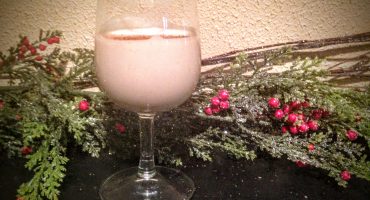The Only Bible I Need
As someone who was raised Jewish, I get Chanukah presents this time of year. And that usually means I get presents before all those crazy Christians. So while most of you are eagerly waiting for the 25th, I already have some presents, courtesy of 80P’s parents (thank you!) and the Jewish calendar based on the lunar cycle.
If you’re still trying to figure out what to get the foodie on your list, and you couldn’t find something here or here, may I suggest to you the anti-cookbook: The Flavor Bible.
Here’s one of my favorite excerpts, and I’m not even kidding, I actually took a highlighter to the page to capture this:
Slavish followers of recipes, who treat them as gospel instead of guidelines, make the mistake of putting more faith in someone else’s instructions than they do in themselves. Many people would do better in the kitchen if they didn’t blindly follow recipes. In fact, following recipes may be holding you back from achieving your potential as a cook.
Let me explain. This is clearly not a conventional cookbook, it’s more about theory and concepts and lists. Lots of lists.
First, it defines flavor and teaches how to build a dish around different aspects, such as: taste, mouthfeel, aroma, and the elusive *x factor.* The book is also filled with interviews from different chefs from around the country (and Canada) about how they conceptualize a dish, how they develop flavors, how they execute the final product. But it’s all in story format. No recipes. No measurements.
And then come the lists. Starting with achiote seeds and ending with zucchini blossoms, authors Karen Page and Andrew Dorenburg list every single food product available and then name all of the other ingredients that could possibly be paired with the starting ingredient. Each ingredient is also defined by its season, taste, weight, best cooking technique and flavor affinities.
Now I haven’t found anything super shocking on the list so far, but I am curious about matching up avocado and yogurt. Where’s the textural differential (does this sound like Gail Simmons?) in that combination?
Oh, but Karen and Andrew totally tease you. For each ingredient, they also list famous dishes, from famous resaturants/chefs featuring that very ingredient. But, there’s no recipe – just the name of the dish. I get their point. We’re supposed to be *inspired* by the name of the dish, but they could at least take a cue from ES and at least discuss ingredients and methods, guidelines, if you will, without providing measurements.
But I have found the book captivating, especially reading about all those molecular gastronomy scientists and their take on how to create unique, yet familiar food. In fact, I wish the book was more about chefs’ theories and less lists. (Does anyone know about a book like that out there? I still 5 days of Chanukah left!)
So if you’re into the ES paradigm of food, you will totally enjoy this new bible.


I really like the quote from the book. Cooking is an art, and adherence to recipes can keep you from really flourishing in the kitchen. Baking, on the other hand, is a science, and usually requires that adherence.
now im not sure if people consider *banana bread* baking or not, but i have figured out ways to mess with it: trying different combos of brown sugar, splenda brown sugar, white sugar, whole wheat flour, white flour, honey, crema mexicana…
I’ll second that! The Flavor Bible is an awesome book. I wrote a full review of it a few weeks ago. Check it out!
http://www.macheesmo.com/2008/12/review-the-flavor-bible/
Cheers,
Nick
I’m really considering getting this book. My stepmom has always amazed me with her ability to figure out food and flavor combinations. You can give her any fridge with the most random leftover ingredients and she will make a five star meal out of it. It boggles my mind
i third this recommendation – this is a great book. it’s really helped me but interesting spins on a lot of otherwise-familiar dishes, and i love the snippets from the famous chefs on how they use a particular ingredient. really inspiring and useful.